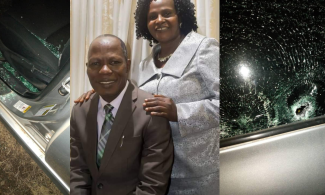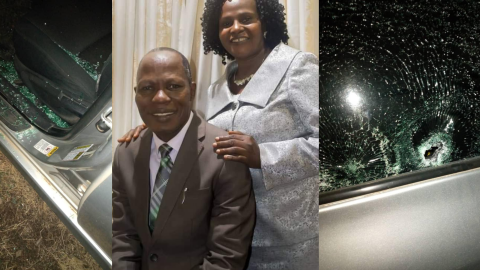
In an interview with SaharaReporters, the Kaduna PFN chairman, who was kidnapped alongside his wife on December 25 and released on December 27, said a ransom of N4.5 million was paid to secure their release.
Chairman of the Pentecostal Fellowship of Nigeria (PFN) Kaduna chapter, Egoh Bako, has revealed that a ransom of N4.5 million was paid to secure his release from the kidnappers' den.
The police had earlier stated that no ransom was paid for the release, according to a report by Premium Times.

But in an interview with SaharaReporters, the Kaduna PFN chairman, who was kidnapped alongside his wife on December 25 and released on December 27, said a ransom of N4.5 million was paid to secure their release.
Bako said the police did not do enough and did not in any way contribute to their release.
He said, "A ransom of N4.5 million was paid for my wife and me. It was not the police that rescued us; even the kidnappers said the police would start lying that they rescued us, there were no police. We were far gone before the police came, they just stopped at my house; they didn't even go beyond the fence of my house.
"Up till this moment, no police have called me, so how can the police say they rescued us? They couldn't even trace us. Even soldiers couldn't have located us, the terrain is too harsh, they can only locate us with the use of technology, no police showed up. God just brought us out.
"I am reachable, I'm accessible, the police should have called me or come to my house. Since they came the day I was kidnapped, they've not come back to check on my children or the situation. They just sit in their office and make statements. It angers the people because people know the truth.
“The government should try to get information from the grassroots and not just sit in the office and draft imaginary statements because the people who go through the experience know what happened and when they hear something different, it angers them. The security agents should go to the grassroots."
[story_link align="left"]88332[/story_link]
Bako said the ransom was paid by concerned individuals who were sympathetic enough about securing his release.
He continued: "These individuals were not even members of my church but people I had impacted their lives at one point or the other. The kidnappers initially demanded a ransom of N20 million. Then they brought it down to N15 million, then N10 million, and then N7 million then. Eventually they put it at N4.5 million. It was paid in cash.
“The person that brought it came with the cash and came face to face with the kidnappers, unlike other cases that they will ask the person to drop the money somewhere. We came out with them from the bush. The man that came with the money came face to face with them, handed over the money to them and they released us to him, (they) waved us goodbye and we parted."
How I Trekked For Days Barefooted
Speaking about his experience in the den of the kidnappers, the PFN chairman recalled trekking barefooted for days after he was abducted, as his slippers were left at the scene of the kidnap.
"We were taken to thick jungles; we were moved from one mountain to another, one valley to another. (I’m talking about) thick bush, uncultivated land that has been there as virgin lands for years; nobody has farmed there.
“There are vast land areas in Southern Kaduna, with no human beings, only animals and few cows. We trekked all through. I particularly trekked without slippers, for those three days. I was barefooted and God just preserved me, there were no blisters. Sometimes, thorns pricked my legs and I would have to sit to remove them. But our hearts were pure and God is real; we came out strong, no injuries, just like Shedrach, Meshach and Abednego did. They went through the furnace of fire and there was no smell of smoke. We came out, went to the hospital to run some tests. We are healthy, no malaria.
"We trekked throughout the three days. We only rested for a maximum of three hours before moving again. Apart from that, the rest of the journey was done on foot. To stay at a spot for too long? No. They were afraid our location could be traced so we just kept changing locations."
Bako said they were not served real food but according to him, it wasn’t a problem for them as he and his wife were accustomed to fasting.
He also said the kidnappers had people who supplied them with food.
"We were given LaCasera and Coke with some small pieces of bread. There were times they brought rice for us but we weren't bothered about the food, we were used to fasting. They had people servicing them. They were not cooking; they had people who brought food for them. They were communicating with people who would bring them food."
The PFN chairman, however, said he was not in any way injured despite being shot at.
He said, "They fired two shots at my vehicle, but God defended me. I was not hurt. There was blood, so a lot of people thought I was killed or injured but it was just a scratch on my hand that spilled that blood but after that, we were calm. We treated them like sons, we were showering them with love, we showed them the love of Jesus. We recognise that they wouldn't have been in those bushes if not for the challenges of life, survival, so we were not confronting, condemning or attacking them.
"Instead, we sympathised with them; we just knew that they needed a means of survival. It is just that they chose the wrong path; they were happy that we didn't condemn or attack them. That melted their heart. They said their victims should be bitter and angry, but we were blessing them, praying for them, so they could leave the bush and go back to their families.
"They complained about the government – the hardship. We told them we are all part of it; if you are hungry, we are all hungry. It's the same government, there are no different governments for each caliber of persons, all of us are suffering but we don't need to kill one another to survive, there are other means of livelihood. They asked for prayers, they asked for forgiveness. All through, they were asking for prayers and forgiveness, and we kept praying for them.
"When they finally got their ransom, they escorted us to safety, waved us goodbye and told us to take ‘Mummy’ (my wife) to the hospital. They told us to return to the (prayer) camp; our prayer worked. (They said) we must not leave the camp, that there would be no attack. They told us about the operations they had had before and they said that was the end. They said they were tired of it and we were so happy."
Bako said the kidnappers were young men between the ages of 17 and 25, who had no jobs, were uneducated and unemployable.
He said the government has to do more to get to the grassroots and help young people who, without getting the assistance needed, are likely to pick up arms and resort to heinous crimes.
"They are all Fulani. They said they didn't have cows. They don't know how to read. They are not employable. They don't know what next and I just feel that something has to be done to take care of this army of youths that are engaging in these heinous activities. The government has to do more to reach out to them.
"I had compassion for them, honestly. What kept us praying for them was the compassion we had in our hearts for them because if they were a little bit settled, they would not be doing what they were doing. The situation in the country left them destitute. We see them as people who are frustrated, who have nobody to care for them. If they had fathers to care for them, they would also be doing what their fathers did. Their fathers reared cows; what happened such that they don't have a single cow, so there's a disconnect somewhere."
Bako stated further that the government had neglected the grassroots, blaming it for the insecurity in the country.
He also said the government should identify ambassadors of peace in communities and not only liaise with political leaders who are only after political interests.